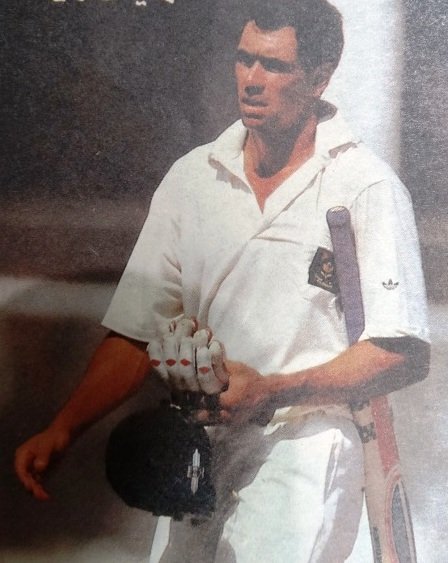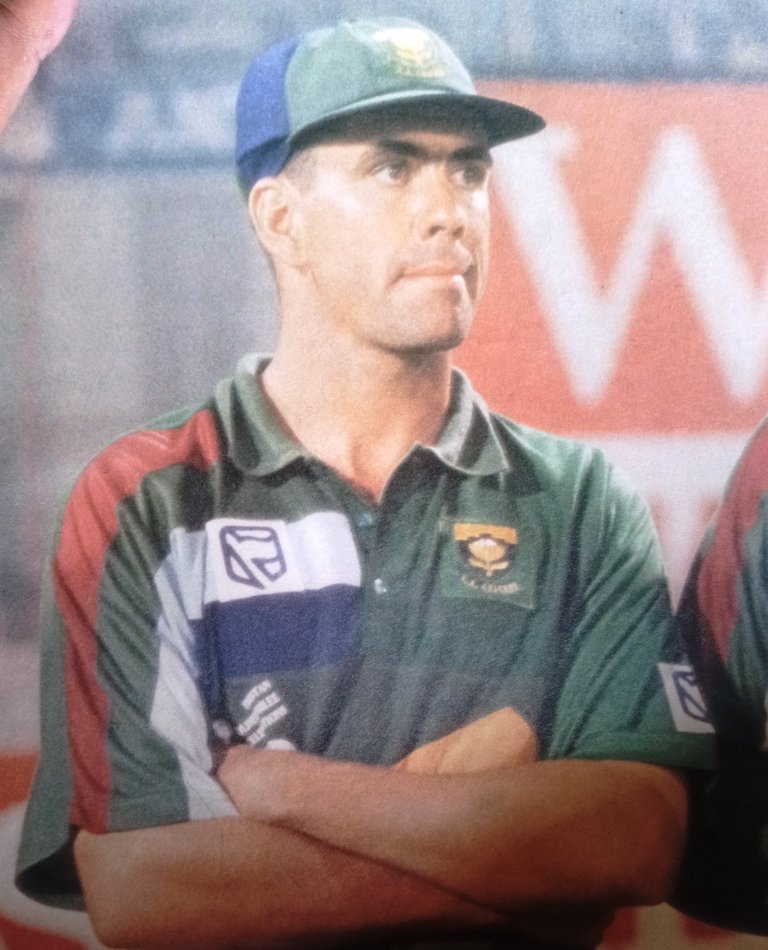Hansie Cronje put up a fight in a match fixing scandal; nothing was concealed from the Commission or the public. An angry former South African cricket captain, Hansie Cronje, claimed on July 24, 2001, that he had cooperated fully with the King Commission and an investigation into his financial affairs. Nothing has been concealed from the commissioner nor from the public,” said the 31-year-old, who has mounted a High Court challenge to a life ban from cricket after he admitted taking money from bookmakers.
We gave them the account numbers so they could do the forensic audit,” he told in a press conference, rejecting allegations of secret bank accounts and baffling deposits as “unconcealed lies and half-truths”. The Sunday Telegraph in London reported on July 22, 2001, that
Cronje owned eight properties and maintained at least 19 bank accounts into which more than 10 million rands (1.2 million dollars) of deposits were made during his reign as South African cricket captain.
The report by auditors Deloitte Touch was not completed because the commission into South African cricket corruption headed by retired judge Edwin King was closed down before the auditors could obtain explanations of some deposits.
Hansie Cronje said he had cooperated with the investigation. On February 5, 2001, I received a number of queries from the auditors. Therefore, on February 9, 2001, the King Commission closed down. That’s the last I heard from them.” Cronje still faces the possibility of criminal charges because King, in his final report, stopped short of endorsing an offer of indemnity which was conditional on Cronje’s making a full disclosure of his involvement in cricket corruption.
The sacked former captain said he was to meet with Bulelani Ngcuka, director of public prosecutions, the next day to obtain clarity on the status of his indemnity. He was also to complain to Ngcuka about the role of South African-based Sunday Telegraph journalist Neil Manthorp, who he said had been “irresponsible” in writing about leaked confidential documents.
Hansie Cronje threatened legal action against newspapers and journalists who had written “defamatory” articles about him. The Johannesburg Star published an apology on July 24 for labeling the newly-disclosed accounts as “secret”. Cronje said all the deposits into the accounts could be explained.
He and his legal team had completed the work started by the auditors and were prepared to make their own report public. During the King Commission hearings last year, Cronje admitted to receiving about 100,000 dollars from bookmakers, Apart from what he had already admitted, he said, every other transaction could be explained as either salary, endorsements, property sales, or transfers from other accounts.
Cronje and the United Cricket Board of South Africa are due to meet in court in September as the former captain challenges the validity of the board’s life ban. “I accept that I am never going to play cricket again,” he said. To accept the ban from a playing point of view but I believe that it is within my rights that that is where the life ban should stop and that’s why I’ve asked the judge to make a ruling.”
Disgraced former South African captain Hansie Cronje revealed last month that he still harbors hopes to coach his country. The 31-year-old, who is banned for life from cricket for taking money from bookmakers, said this despite his part in manipulating matches during his five-year tenure as South Africa’s captain. He is well qualified for the job. I think that one day I would certainly like to have that opportunity because I certainly tried my entire career to make South Africa the number one cricket-playing country in the world.
That’s what I lived for, trained for, and breathed for,” Cronje told BBC Radio. Former South Africa coach Bob Woolmer, who worked alongside Cronje for five years when in charge of South Africa in the mid-’90s, believes the former Free State batsman has the right credentials to become a top coach.
If the cricket world is ready to give him, I think he would make a very good coach,” Woolmer told the Daily Telegraph. “Like anyone, he should serve his apprenticeship down the ranks, at the club or provincial level.
Otherwise, I have no problem with the idea.” Woolmer’s views are in stark contrast to those held by former England coach David Lloyd, who told the Telegraph that the game is better off without Cronje. “He’s got to be joking, hasn’t he?” said Lloyd. “Can’t he just crawl away and leave everybody to get on with the game of cricket?”
Hansie Cronje was banned from all levels of the game by the United Cricket Board (UCB) last year (2000) after admitting that he received over 120,000 pounds (168,000 USD dollars) from gamblers and bookmakers for match-fixing.
He expects to overturn the ban in Pretoria’s High Court in September. However, the United Cricket Board (UCB) has insisted that the ban on all cricket activity remains in place and they are likely to contest the High Court action by Cronje.
Cronje accepts his punishment but believes the United Cricket Board of South Africa cannot keep him away from the game that he loves from his heart. “I accept the life ban on playing,” he said. “My conduct wasn’t high-quality, but any other sphere of life — whether it’s attending a mate’s benefit cricket dinner or watching my son play cricket at Lord’s — I believe the United Cricket Board of South Africa and the International Cricket Council have no jurisdiction over that.”

Cronje comes out fighting
After a year during which his public appearances have been marked by tears and various degrees of contrition,. Hansie Cronje betrayed anger for the first time on July 24, 2001, at a press conference in which he claimed to have answered all outstanding queries about his financial affairs.
He also satisfied the conditions of his indemnity against criminal prosecution and threatened to institute legal action against those who leaked and published an incomplete forensic audit into his affairs, thus writing Peter Robinson on the website CricInfo.
The next day, Cronje’s legal team was to meet Bulelani Ngcuka in an attempt to convince the South African Director of Public Prosecutions that he had met the terms of the indemnity deal struck before last year’s King commission hearings. Cronje’s case will be based on a 13-page document which, he says, provides explanations for some 120 transactions queried by forensic auditors Deloitte Touche.
He will also argue that details of some 19 bank accounts and eight properties, three of which he still owns, were provided by him to officials of the King commission before and during last June’s hearings. All of this was made public in response to a Sunday Telegraph report, written by Neil Manthorp, in which details of what can only be described as a provisional forensic audit were listed.
Hansie Cronje, it has to be said, was extremely plausible at his press conference. He was also clearly angry. “I’m sorry I’ve had a go at, he apologized to the journalists, “but I’m’ cross.”
He denied ever having the auditors in their inquiry criticize both Deloitte Touche and the King commission for wasting millions of Cronje claimed that the audit report, dated November 5, 2000, had only been received at the offices of his lawyer, Leslie Sacktein, on February 3, a Saturday. He said he had seen the report for the first time on February 5. On February 9, 2001, Justice Edwin King closed his commission.
According to Cronje, the only contact the auditors had with himself or his legal advisers was to set up a meeting on December 21. He said that the auditors canceled the meeting on the evening of December 20. A figure of R10.5million was mentioned in the Sunday Telegraph as the total amount of deposits made into his various accounts.
Cronje has clearly spent a great deal of time working through these deposits. Some, he said, were salary deposits made by the United Cricket Board and, before that, the Free State Cricket Union. He produced a document from Ian Smith, the then Director of Finance at the United Cricket Board of South Africa, which confirmed Cronje’s salary payments.
The mysterious “Magda”, who was featured in the Sunday Telegraph story as making a number of deposits, is identified as a woman who then worked for Clifford Green, the United Cricket Board of South Africa legal adviser. Green also acted as a Cronje agent for some time, and other deposits, said Cronje, simply reflected inter-account transfers as he moved money from one account to a higher interest-bearing account.
For all bar two transactions, Cronje had an explanation. According to Sackstein, these ‘gaps existed because Cronje’s banks had not yet been able to track down the transactions in their archives.
Most particularly, though, Cronje reserved his wrath for Neil Manthorp, the author of the Sunday Telegraph article. Sackstein said he intended to lay charges under the South African Commissions Act against Manthorp and the unnamed officials who provided a copy of the audit report.
The maximum penalty for disclosing and publishing commission documents without permission, said Sacktstein; is a six-month jail sentence. Therefore, Hansie Cronje suggested that Manthorp had launched a personal campaign against him as a result of an argument between the two during South Africa’s tour of Australia in 1998.
In fairness to Manthorp, his story, as published last month, makes no mention of “secret” accounts or “undisclosed” dealings. These were written into the story in woefully inept interpretations of the original in South Africa’s Monday morning papers on July 23.
For all Cronje’s bullishness, however, he did not touch upon any dealings involving a NatWest account held by him. In their report, the auditors say: “For example, the NatWest account bank statements would help us identify foreign earnings, as mentioned by Cronje in his statement of June 15, 2000, that his NatWest account was used for ‘my foreign earnings.”
Hansie Cronje, who was to attend his grandmother’s funeral on the afternoon of July 24, could not be contacted in the evening for clarification. And also the same evening, Sipho Ngwema, a spokesman for the South African DPP, continued to insist that Cronje had not been given an assurance of indemnity at the King commission. He said that the meeting between the DPP and Cronje’s lawyers was to allow the Cronje team to “make representations.
Read More – Andrew Hall – South African All-Rounder
